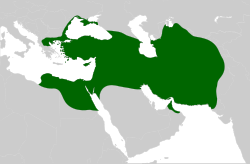Achaemenid empire
The Achaemenid Empire (/əˈkiːmənɪd/, from Old Persian Haxāmanišiya,c. 550–330 BC), also called the (First) Persian Empire, was an empire based in Western Asia, founded by Cyrus the Great. At its greatest extent from the Balkans to the Indus Valley, it was one of the largest empires in history, spanning 5.5 million square kilometers, and was larger than any previous empire in history. It is equally notable for its successful model of a centralised, bureaucratic administration (through satraps under the King of Kings), for building infrastructure such as road systems and a postal system and the use of an official language across its territories and a large professional army and civil services, inspiring similar systems in later empires. It is noted in Western history as the antagonist of the Greek city-states during the Greco-Persian Wars and for the emancipation of the Jewish exiles in Babylon. The Mausoleum at Halicarnassus, one of the Seven Wonders of the Ancient World, was built in a Hellenistic style in the empire as well.
...
Wikipedia


